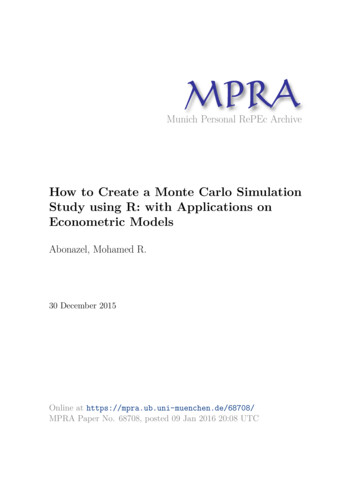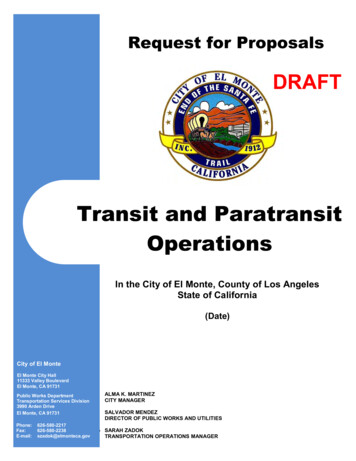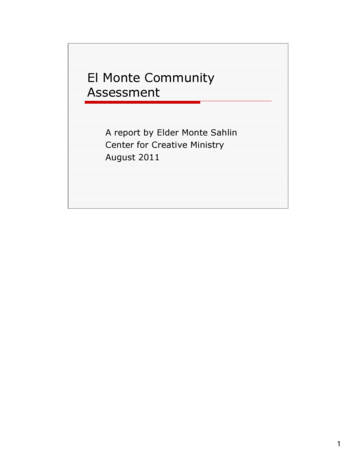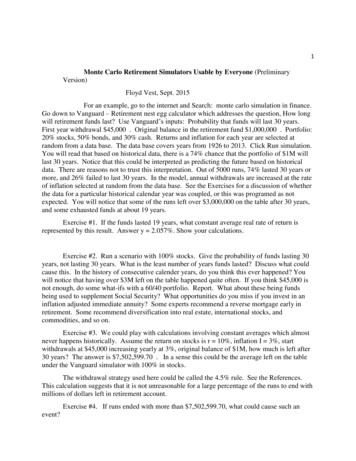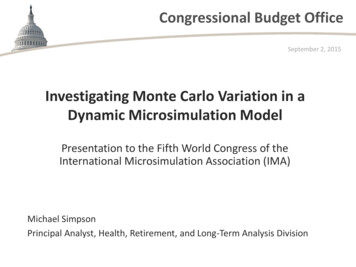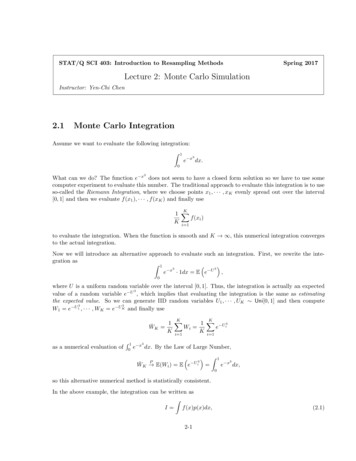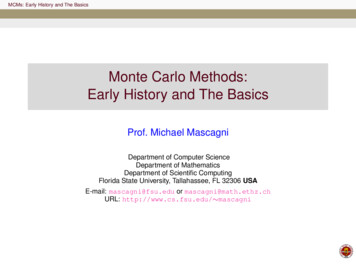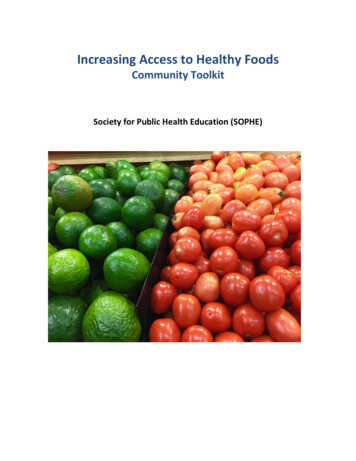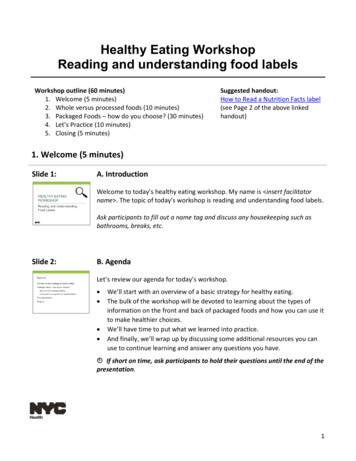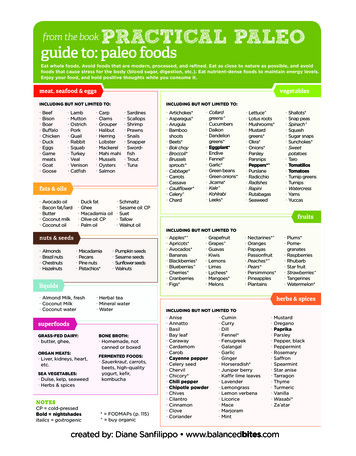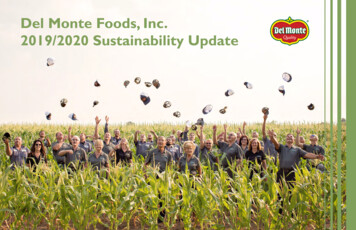
Transcription
Del Monte Foods, Inc.2019/2020 Sustainability Update
IntroductionA LETTER FROMOUR CEOGoalsSDGsPar tnering for GoodSustainable AgriculturePackaging and PlasticsAt Del Monte Foods, we have been in the business of producing healthyto deepen and grow. We were recognized by Feeding Americafood in partnership with family farmers for more than 130 years. Ouras a Mission Partner for our contributions and commitments. Wecorporate values guide our support of the communities where westarted working with the Sustainable Packaging Coalition tolive and work, and we are constantly employing new and cutting-edgeincrease recyclability and reduce plastic waste. We continued ourtechnologies to conserve a healthy environment. That way, we can all lookwork with the Food Waste Reduction Alliance to increaseforward to a sustainable future where food is grown in harmony withfood donations and ensure that unavoidable food waste is put tonature and farm communities thrive.good use. And we formed a partnership with GrowingGreat to bring hands-on science and nutrition education to elementaryWhile we were looking forward to launching this 2019/2020and middle school children, empowering a generation ofSustainability Update on Earth Day, we chose to delay its release forhealthy eaters. We look forward to continuing to evolve thesethree reasons: the COVID-19 pandemic, which required us to focus onrelationships in the coming years while also supporting otherthe safety of our team members; ensuring that people around thegroups like the NAACP and the National Black Farmerscountry would continue to have regular access to nutritious food;Association.and the Black Lives Matter movement, which awakened awareness not“just in this country but around the world to racial injustice, promptingAcross Del Monte Foods, we are making great strides onall of us at Del Monte Foods to do even more to fight racism andour sustainability journey, from improving our Earth-friendlysupport the Black community.agricultural practices that reduce the use of water and pesticidesto participating in programs that provide hungry people withAlways, we are guidedby our commitmentto nurturing Earth’sgoodness today to growa healthier, moreresilient and morehopeful tomorrow.Del Monte Foods issued our first sustainability report in 2018. Ournutritious meals. Always, we are guided by our commitment to2019/2020 Sustainability Update outlines our 2025 goalsnurturing Earth’s goodness today to grow a healthier, morearound three pillars: Cultivate a Healthy Planet, Nurture People andresilient and more hopeful tomorrow.Grow Accessible Nutrition. Our goals align with the UN SustainableDevelopment Goals, which serve as a framework for companieseverywhere contributing to a sustainable future so that collectively, wecan meet current needs without compromising resourcesfor future generations.During the past year, our partnerships with organizations working toconserve natural resources and nurture a healthier tomorrow continued01DEL MONTE FOODS2019/2020 SUSTAINABILITY UPDATESincerely,Greg LongstreetPresident & CEO, Del Monte Foods, Inc.
IntroductionGoalsSDGsPar tnering for GoodSustainable AgriculturePackaging and PlasticsT A B L E O F CONTENTS01WHO WE ARE05pg. 030302OUR GOALSpg. 0504SUSTAINABLE AGRICULTUREUN GLOBAL GOALS pg. 07pg. 09PARTNERING FOR GOOD06PACKAGING AND PLASTICSDEL MONTE FOODS2019/2020 SUSTAINABILITY UPDATEDpg. 11RTpg. 1302
IntroductionGoalsSDGsPar tnering for GoodSustainable AgricultureWHO WE AREAbout Del Monte FoodsDel Monte Foods, Inc. (Del Monte Foods), a whollyowned subsidiar y of Del Monte Pacific Limited (DelMonte Pacific) is headquar tered in Walnut Creek, CA,with net sales of 1.4 billion and 7,390 employees.Del Monte Foods is one of the countr y’s largestproducers, distributors and marketers of premiumquality branded food products for the U.S. retailmarket. We offer a wide array of vegetable and fruitproducts under the following por tfolio of brands: DelMonte , Contadina , S&W , and College Inn . Formore information, please visit DelMonteFoods.com/Our-Stor yAbout this Sustainability UpdateSTRUCTURESince Del Monte Pacific, our parent company, is listedon the Singapore Exchange Securities Trading Limited(SGX), both entities fall under the SustainabilityRepor ting Guide (Guide) and Rule. To align with theSGX Guide, Del Monte Foods repor ts biannuallyfollowing the Global Repor ting Initiative (GRI)Sustainability Repor ting Standards. Between therepor ts, we produce a Sustainability Update, such asthis document, to share key sustainability milestonesand progress.BOUNDARIESThis update covers fiscal year 2019/2020 for our entireoperations, including our locations in the United States,Venezuela and Mexico. Any locations closed duringthis time were either removed from our data or arespecifically addressed in the relevant sections.03DEL MONTE FOODS2019/2020 SUSTAINABILITY UPDATEPackaging and Plastics
IntroductionGoalsSDGsPar tnering for GoodSustainable AgriculturePackaging and PlasticsDEL MONTE’S PURPOSEDel Monte Foods is in the business of producing healthy food and nourishing healthy lives—responsibly. We are on a mission to provide access to better food choices, because ever yonedeser ves great-tasting, high-quality, nutritious meals. We are also committed to cultivating food that suppor ts a healthy environment so that future generations can enjoy all of Ear th’s bounty.CULTIVATEA row food in a responsible andsustainable manner, from rootsand soil to water and climate.Cultivate connections betweenteam members, growersand communities.Provide consumers withbetter food choices andmore access to them.IIIIIIDEL MONTE FOODS2019/2020 SUSTAINABILITY UPDATE04
02OUR GOALSImproving our practices by settingtangible sustainability goalsLong-term economic growth, the eradication of hunger and theconser vation of natural ecosystems depend on developmentthat is economically, environmentally, socially and institutionallysustainable.With the input of many external and internal stakeholders, we’vedeveloped 11 goals designed to address our material issuesand enable us to make positive contributions to the planet, toindividuals, to families and to communities.Each goal has a series of target metrics, allowing us to accuratelyassess and repor t on our progress over time.
IntroductionPILLARGoalsSDGsPar tnering for GoodSustainable AgricultureOBJECTIVESReduce energy use and emissionsin transportation and distribution.Packaging and Plastics2025 GOALSReduce empty miles driven from dedicatedoperations by 20%.Increase truckload efficiency in mpg by 14%.ICULTIVATEA HEALTHYPLANETReduce waste and the useof virgin material in packaging.Convert plastic packaging to 100% recyclable,reusable or compostable by 2030.Include 25% recycled content into plastic packagingonce recycled polypropylene supply is availableand FDA approval is received.Add How2Recycle icons to 100% of our packaging.Improve farming practicesand enhance soil quality.Promote a culture of diversity and inclusionso all team members feel respected and canbring their best selves to ease cover-cropping by 5% per year.Define and measure employee engagementand achieve top quartile scores.Establish Diversity Leadership Council and expandemployee resource groups.Increase diversity across leadership roles.Provide the opportunity for all team membersto earn a living wage.Support grower and community partnersthrough our “Farm2Family” corporategiving program.Donate an average of five million pounds of food each yearto support disaster relief, local food banks and nonprofits.Empower organizations committedto the advancement of agricultural,health and nutrition education.Educate an average of five million children andparents annually through outreach efforts that focus onexpanding knowledge around nutrition and makinghealthy eating choices.DEL MONTE FOODS2019/2020 SUSTAINABILITY UPDATE06
03UNITED NATIONSGLOBAL GOALSDel Monte Foods’ sustainabilitypriorities are aligned with theUnited Nations SustainableDevelopment Goals.Del Monte Foods is working to build a world where food isnutritious and accessible to ever yone, in which natural resourcesare managed to maintain the healthy functioning of ecosystems,and to suppor t current and future human needs.Our effor ts are guided by the 17 United Nations SustainableDevelopment Goals (UN SDGs), which were established in 2015and provide a framework for targeted improvements and greaterimpact over time.Nothing connects people to the planet more than food, andby ser ving as a bridge between what people eat and the wayit’s grown, agriculture is key to achieving multiple UN SDGsand helping us overcome some of the world’s most complexchallenges, including the root causes of pover ty and hunger.
IntroductionGoodHealth andWell-BeingGoalsSDGsPar tnering for GoodClean Waterand Sanitation(UN SDG 6)(UN SDG 3)Del Monte Foods continuesto make significant progresstoward the UN SDGs, helpingto suppor t a healthy andbalanced future for peopleand the planet.Zero Hunger(UN SDG 2)Del Monte Foods’Farm2Family corporategiving program contributesto farm advocacy(conservation andeducation), hunger relief,disaster relief, family careand healthy living. Wedonate slightly imperfectmerchandise and excessfood to Feeding Americaand Field to Foodbank.This also allows us toreduce our food waste—everything we donate isshelf-stable and needed byhungry communities.Over two-thirds of ourproducts are classified as“healthy” from the globallyaccepted definition, andall of our products arethermally processed tominimize foodborneillnesses. Within ourexisting categories, we havea significant competitiveset of No Sugar Addedfruit products, and NoSalt Added and ReducedSodium vegetable productsrelative to other brandedplayers. Our fruits andvegetables are picked,cooked and packed at thepeak of ripeness, locking innutrients. Real food tastesbetter, and that’s why we’veworked hard to removepreservatives. About 97%of all Del Monte cannedfruit, vegetable and tomatoproducts are preservativefree, and Vitamin C is theonly preservative we use infruit cups and canned fruit.We work with growersto reduce water use byadopting methods like dripirrigation—now used bynearly all tomato growers—and capturing and reusingwater where possible atall facilities, including ourHanford and Modesto, CA,plants, where water use hasdropped 20% since 2013.Decent Workand EconomicGrowth(UN SDG 8)We are building a cultureof safety, with the goal ofzero incidents. To ensureour suppliers uphold thesestandards and to eliminatelabor violations in our supplychain, we are enforcingour Supplier Code ofConduct. And to strengthenfarmer livelihoods, we aresupporting innovations toenhance soils, crop yieldsand resiliency.Sustainable AgricultureSustainableConsumption andProduction(UN SDG 12)To promote sustainableproduction, Del MonteFoods focuses onregenerating topsoil andimproving above- andbelow-ground biodiversityby applying our modelpesticide control program,crop rotation, consistentsoil sampling and usingpest-resistant varietieswhen possible. Throughour classic method ofplant breeding, we providegrowers with plants thatare naturally resistantto diseases and insects,reducing the need forfertilizer and pesticides.We are also continuingto use packaging witha lower impact. Morethan two-thirds of ourpackaging is steel cans,which includes approx. 35%recycled steel—an infinitelyrecyclable material. Ourwood pulp packaging iscomprised of 33% recycledcontent.Packaging and PlasticsClimate ActionLife Below Water(UN SDG 13)(UN SDG 14)We are adamantlycommitted to minimizingthe emissions thatcause climate change.We have gone beyondthe standard emissionsrequirements in Californiaand reduced emissions bygenerating energy fromsolar panels at processingand manufacturingcenters. Also, locating ourprocessing plants close toour growing fields reducestransportation emissionsand improves the overallefficiency of our facilities.Life on Land(UN SDG 15)We are committed topreserving ecosystemsboth on land and belowthe water. Del MonteFoods prevents nutrientrunoff into waterways bymaintaining proper soilhealth and by applying ourmodel pesticide controlprogram, rotating crops,consistently sampling soiland by using pest-resistantcrop varieties, which weprovide to our growers sothey can reduce the needfor fertilizer and pesticidesthat could negatively impactthe environment.Partnerships(UN SDG 17)We are committed toengaging with all stakeholdersto further the SustainableDevelopment Agendathroughout our entire valuechain. We know we cannotaddress the long-termchallenges of the SDGs alone.DEL MONTE FOODS2019/2020 SUSTAINABILITY UPDATE08
04PARTNERINGFOR GOODFighting the complex, thornyand interrelated challenges ofhunger and climate change takesmore than a single company’sbest intentions. That’s why DelMonte Foods partners with severalorganizations to ensure a moreprosperous, sustainable future.Food WasteReduction AllianceWe’ve continued our workwith the Food WasteReduction Alliance, anindustr y-led initiative with theConsumer Brands Association,FMI —The Food Industr yAssociation and the NationalRestaurant Associationfocused on reducing foodwaste by increasing fooddonations and sendingunavoidable food wasteto productive use.
IntroductionGoalsSDGsPar tnering for GoodSustainable AgriculturePackaging and PlasticsGrowingGreatSustainablePackaging CoalitionIn 2019, we star ted working with theSustainable Packaging Coalition, aglobal organization that works to empowercompanies to take meaningful action towardmore environmentally friendly packaging,such as increasing recyclability andreducing plastic waste.In 2019, we suppor ted theWorld Food Day onlinefood drive on Amazon,together with KelloggCompany.TMIn 2019, we launched a par tnershipwith GrowingGreat to bring handson science and nutrition education toelementar y and middle school children,empowering a generation of healthy eaters.This program benefits young people acrossthe countr y with curricula about growinggood food. It aligns with our Growersof Good initiative, which is focused onnur turing the Ear th’s goodness today to growa healthier and more hopeful tomorrow.Feeding AmericaIn 2019, we donatedIn March 2020, we donated4.4 millionpounds of foods to feedfamilies across America. 2 million4of food to fight foodinsecurity during COVID-19.Initiatives such as our Brite Recovery Program and our partnership with FeedingAmerica allow us to eliminate waste and feed people. Rather than discarding slightlydamaged cans or imperfect produce, we donate the food to people in need. In 2019,4 truckloadsof peaches that would have goneto waste ended up in people’s pantries.95,000children, parents and teachersreached by GrowingGreat action.8new science center, children’smuseum, zoo and schoolpartnerships.In addition to these par tnerships, our team membersvolunteered at local food banks, youth organizations,and completed environmental stewardship projectsthroughout the U.S.DEL MONTE FOODS2019/2020 SUSTAINABILITY UPDATE10
05GROWINGGOOD WITHSUSTAINABLEAGRICULTUREWe have long been considered aleader in introducing agriculturalpractices that minimize the use ofpesticides and help farmers growhealthier, heartier crops usingless fertilizer and water.Sustainable agriculture is key to conser ving biodiversity, reducingthe impacts of climate change and improving the living andworking conditions of farm communities. At Del Monte Foods,we are focused on helping our growers integrate Ear th-friendlyfarm practices that improve soils, reduce water and pesticide useand improve efficiency.The success of our business relies on a healthyenvironment, both in our growers’ fields and acrossour own operations. We work to drive sustainableagriculture practices through the following methods:USING DRIP IRRIGATION TO REDUCE WATER USEENCOURAGING COVER CROPSREDUCING FERTILIZER USEI NCREASING YIELDS THROUGH SEED BREEDING(NON-GMO)REDUCING PESTICIDE USE
Introduction U SING DRIP IRRIGATIONTO REDUCE WATER USEIn recent years, the switch to drip irrigation has been a significant,game-changing practice in water management, particularly in aridareas of the western U.S., and especially in California, where watersupplies are vulnerable to reservoir levels, snow melt and limitedgroundwater. Drip irrigation systems facilitate the application ofprecisely required amounts of plant nutrients, eliminate surfacewater runoff to prevent possible contamination of streamsand groundwater, and help to reduce plant diseases and weedoutbreaks due to excess water. E NCOURAGINGCOVER CROPSGoalsSDGsPar tnering for GoodSustainable Agricultureand reduced crop yields. Fertilizers can also leach into groundwateror wash off with the rain into nearby waterways, polluting streamsand causing problems such as algae growth. Finally, syntheticfertilizers are often based on petroleum — an expensive and nonrenewable resource. Given the environmental risks and operatingcosts associated with improper or excessive fertilizer use, ourresearch teams coordinate with our growers to identifythe optimal amount of fertilizer per crop. We have foundthat some crops need much less fertilizer to flourish than expected.For example, over the past several years, our pea and green beangrowers have reduced fertilizer application by upwards of 25% over50,000 acres. Although rising fertilizer costs contributed to thisdecision, Del Monte Foods research also showed that crops do justas well or better with less fertilizer.Packaging and Plasticsapproach to pest control. Instead of routinely applying pesticideson a set schedule, growers closely monitor crop conditions anduse cultural tools (such as crop rotation or seeds that are diseaseresistant) to help avoid conditions that could contribute to pestoutbreaks. By limiting pesticide use, we reduce the potentialfor contaminated runoff from fields, protect the healthof farm workers, prevent the destruction of beneficialinsects and other field organisms and ultimately decrease thechance that any pesticide residue remains on the crop when it isharvested and processed.WE WORK WITH OUR GROWERS TO:Another practice that we encourage, especially in the Midwestgrowing areas of Wisconsin and Illinois, is the use of winter covercrops, which help increase organic matter, reduce wind andsoil erosion, sequester carbon, filter water, control weedsand manage nutrients. Factors, including weather conditions,previous harvest conditions, location and rotation requirements, canaffect cover crop applications, which means the acreage for covercrops can vary. With the CropTrak system, we monitor covercrops, and had a 6% increase from 2018 to 2019 in cover cropson all vegetable crops in all states combined. There was an 11.9%increase in cover crops grown in Wisconsin alone. I NCREASING YIELDS THROUGHSEED BREEDING (NON-GMO)Apply our model pesticidecontrol program.Our expert plant breeders and research farm staff work intandem with our growers to introduce new cropvarieties with improved yields. The benefits are significant: forexample, a 30% increase in yield means that 30% less acreageneeds to be planted, and 30% fewer inputs such as fertilizer or fuelfor farm equipment are needed to harvest the same amount ofcrop. Over the past 48 years, our Blue Lake green bean breedingprogram and new growing practices have increased yields bynearly 200%.Use pest-resistant varietieswhere available. R EDUCINGFERTILIZER USE R EDUCINGPESTICIDE USEOur growers apply fertilizer to crops to ensure that the plantsreceive enough nutrients to grow vigorously and produce abundantyields. Too much fertilizer, however, can be worse than not enough.In many crops, excess nutrients can lead to lush vegetative growthBeginning in the early 1980s, we introduced our growers to theprinciples of Integrated Pest Management (IPM) and continue tohelp them minimize the amount of pesticides they use to controlinsects, other pests and crop diseases. IPM is a common-senseRotate crops to minimizethe effect of soil insects and diseases.Our work to disseminate best practices in IPMas a way to minimize pesticide use has resultedin great success. For example, our IPM researchteam found that a new seed treatment provided30 days of protection for sprouting green beans.Once implemented, the treatment eliminatedthe use of 3,700 gallons of broadcast insecticide(application over an entire area) per year.DEL MONTE FOODS2019/2020 SUSTAINABILITY UPDATE12
06PACKAGINGAND PLASTICSWhile the majority of our productsare sold in recycled metal cans,we are focused on reducing theimpact of our packaging in everyway possible.This means working to drive recycling of packaging, increasingthe recyclability of packaging and reducing plastic and materialuse where possible. In 2019, we joined the Sustainable PackagingCoalition to par tner with leading packaging suppliers andconsumer packaged goods companies to work toward sustainablepackaging solutions that deliver delicious shelf-stable food. Wehave also advocated for recycling and sustainable packagingthrough the Consumer Brands Association, as members of thePackaging Committee. By including recycling information on ourpackages and on our website, DelMonteFoods.com, we are raisingawareness and increasing transparency. We are also exploringnew materials and formats to increase recyclability and reducethe need for new resources.
IntroductionGoalsSDGsPar tnering for GoodSustainable AgricultureWe have been reducing our use of plastics and metal throughlightweighting of our packaging from 2009–2020.PLASTIC PACKAGING LIGHTWEIGHTING4 OZ. CUPTOTAL PLASTIC REDUCTION4,300 TONS7 OZ. CUPTOTAL PLASTIC REDUCTIONPackaging and PlasticsIN 2019, WE ESTABLISHED CLEARPACKAGING GOALS, WITH A 2025 TARGET:iTransparencyWe are committed to letting people know whatour packaging is made of and how to recycle it byincluding detailed instructions on our packages usingthe How2Recycle label.1,300 TONSCertified FiberMETAL CAN LIGHTWEIGHTINGVEGETABLE CANSREDUCED METAL USAGE11,500 TONSTOMATO CANSREDUCED METAL USAGE3,700 TONSFRUIT CANSREDUCED METAL USAGE1,800 TONSCurrently, all of the 12,000 tons of corrugatedmaterial we use for trays, cases and displays iscer tified by the Forest Stewardship Council (FSC).As we move closer to 2025, we’ll work with oursuppliers to remain 100% cer tified, either throughthe FSC or the Sustainable Forestr y Initiative (SFI),for corrugated and other packaging materials.RecyclabilityWe are working with our suppliers to overcome thetechnical challenges inherent to applying recycledplastic content to materials that touch packagedfoods vs. secondar y outer packaging. We also aimto source more recyclable polypropylene that issuitable for food contact.DEL MONTE FOODS2019/2020 SUSTAINABILITY UPDATE14
Corporate Social ResponsibilityDel Monte Foods, Inc.3003 Oak RoadWalnut Creek, CA 94597USAwww.delmontefoods.comCopywriting, editing and design:
Del Monte Foods issued our first sustainability report in 2018. Our 2019/2020 Sustainability Update outlines our 2025 goals around three pillars: Cultivate a Healthy Planet, Nurture People and . Support grower and community partners through our "Farm2Family" corporate giving program. Provide the opportunity for all team members to earn a .
